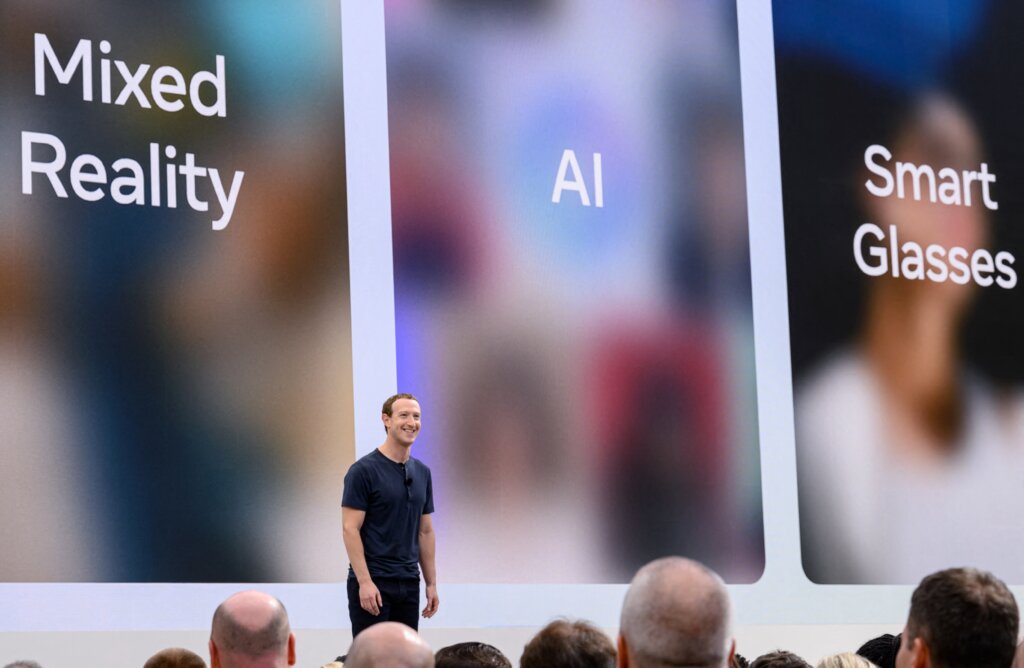
Mark Zuckerberg, CEO of Meta, testifies during the US Senate Judiciary Committee hearing “Big Tech and the Online Child Sexual Exploitation Crisis” in Washington, DC, on January 31, 2024. (Photo by ROBERTO SCHMIDT / AFP)
Here’s how Meta plans to take on the AI chips market
- Meta readies Artemis’ to break free from Nvidia’s AI chips while challenging Microsoft and Google in the field.
- Meta eyes an extra US$9 billion on AI in 2024, aiming beyond the US$30 billion annual investment.
- Zuckerberg believes Meta’s AI edge is its walled data garden vs Google and Microsoft’s web crawling reliance.
In the ever-shifting landscape of technology, Meta recently stood at a pivotal juncture. Once heralding the ambitious vision of a metaverse, where the physical and digital world seamlessly intertwined, Meta confronted obstacles that led to a reality check and loss of billions of dollars. Alas, the grand metaverse dream, which once seemed boundless, faced a catastrophic failure. However, Meta, under the leadership of Mark Zuckerberg, refused to linger in the aftermath of disappointment. Instead, the social media giant swiftly redirected its focus to a new horizon: AI and cutting-edge chips.
Meta’s CEO, Mark Zuckerberg, acknowledges the metaverse challenges but frames them as learning opportunities. In a recent address, he emphasized that while the metaverse vision persists, the immediate focus is leveraging AI to enhance user experiences across existing platforms. The goal is clear – to infuse AI into the core of Meta’s offerings, creating a personalized and intelligent digital environment.
It started with a significant move last July when Meta disrupted the competition for advanced AI by unveiling Llama 2, a model akin to the one driving ChatGPT. Then, last month, Zuckerberg introduced his vision for artificial general intelligence (AGI) in an Instagram Reels video. In the previous earnings call, Zuckerberg also emphasized Meta’s substantial investment in AI, declaring it as the primary focus for 2024.
2024: The year of custom AI chips by Meta?
In its quest to empower generative AI products across platforms like Facebook, Instagram, WhatsApp, and hardware devices like Ray-Ban smart glasses, the world’s largest social media company is racing to enhance its computing capacity. Therefore, Meta is investing billions to build specialized chip arsenals and adapt data centers.
Meta is gearing up to introduce Artemis, its latest AI chip, into its global data centers. This innovative chip represents the next wave in Meta's silicon development, offering a strategic advantage by lessening its dependence on Nvidia's prevalent chips. pic.twitter.com/V9leNMRLyA
— Interesting Engineering (@IntEngineering) February 2, 2024
Last Thursday, Reuters got hold of an internal company document that states that the parent company of Facebook intends to roll out an updated version of its custom chip into its data centers this year. The latest iteration of the custom chip, codenamed ‘Artemis,’ is designed to bolster the company’s AI initiatives and might lessen its dependence on Nvidia chips, which presently hold a dominant position in the market.
If successfully deployed at Meta’s massive scale, an in-house semiconductor could trim annual energy costs by hundreds of millions and slash billions in chip procurement expenses, suggests Dylan Patel, founder of silicon research group SemiAnalysis. Moreover, the deployment of Meta’s chip marks a positive shift for its in-house AI silicon project.
In 2022, executives abandoned the initial chip version, choosing instead to invest billions in Nvidia’s GPUs, dominant in AI training. The upside is that Meta is poised to accumulate many coveted semiconductors. Mark Zuckerberg revealed to The Verge that by the close of 2024, the tech giant will possess over 340,000 Nvidia H100 GPUs – the primary chips used by entities for training and deploying AI models like ChatGPT.
Additionally, Zuckerberg anticipates Meta’s collection to reach 600,000 GPUs by the year’s end, encompassing Nvidia’s A100s and other AI chips. The new AI chip by Meta follows its predecessor’s ability for inference—utilizing algorithms for ranking judgments and user prompt responses. Last year, Reuters reported that Meta is also working on a more ambitious chip that, like GPUs, could perform both training and inference.
Zuckerberg also detailed Meta’s strategy to vie with Alphabet and Microsoft in the high-stakes AI race. Meta aims to capitalize on its extensive walled garden of data, highlighting the abundance of publicly shared images and videos on its platform and distinguishing it from competitors relying on web-crawled data. Beyond the existing generative AI, Zuckerberg envisions achieving “general intelligence,” aspiring to develop top-tier AI products, including a world-class assistant for enhanced productivity.

Meta founder and CEO Mark Zuckerberg speaks during the Meta Connect event at Meta headquarters in Menlo Park, California, on September 27, 2023. (Photo by JOSH EDELSON / AFP)
READ MORE
- 3 Steps to Successfully Automate Copilot for Microsoft 365 Implementation
- Trustworthy AI – the Promise of Enterprise-Friendly Generative Machine Learning with Dell and NVIDIA
- Strategies for Democratizing GenAI
- The criticality of endpoint management in cybersecurity and operations
- Ethical AI: The renewed importance of safeguarding data and customer privacy in Generative AI applications


